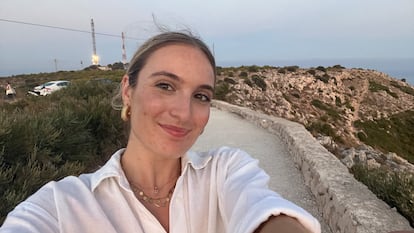The emotional scars that acne leaves in adult women
Pimples after adolescence are becoming increasingly common. A recent study has analyzed the social stigma of this pathology

Every day, before going to college, Beatriz Ruiz used to spend a long time brushing her hair. It wasn’t so much to show off her hairstyle, though, as it was to cover her face. The bangs hid the pimples on her forehead; the side strands hid those on her cheeks. She literally buried her face in hair. Before opting for such hair engineering, Ruiz had tried other, more classic methods: makeup, creams, pills... she tried everything, but the pimples were not going anywhere. All she could do was hide them. Hide herself. Ruiz felt insecure, although sometimes she managed to forget. At times she thought that she could act like nothing was the matter. Maybe she would go to a party to socialize. “Then, after all the effort you made to forget about it, you’re talking to somebody and suddenly you realize they’re not making eye contact; they’re looking at your face, your pimples,” says this 25-year-old content creator. “And you think, ‘Damn, I didn’t cover them well,’ and you get all insecure, and there is a huge setback in your acceptance process.”
Ruiz’s case is not exceptional: 30% of women and 7% of men over 25 years of age suffer from acne. And the lesions this condition leaves on a person’s face can damage self-esteem and confidence. A study that was recently presented at the congress of the European Academy of Dermatology and Venereology reveals the significant stigma that is associated with this pathology. Researchers assessed the effect of different anatomical variants of acne on natural gaze patterns and social perception, tracking the eye movements of 245 participants who viewed neutral and emotional faces of women with different types of acne, and found that their gaze gravitated more to the pimples than the eyes. In addition, the faces with acne were perceived as less attractive, trustworthy, successful and confident.
“Gaze behavior depends on gender and age,” explains dermatologist Marek Jankowski, lead author of the study. “And also on culture. For example, Western Europeans [who look more at the eyes and mouth] have a different looking strategy than Asians [who focus on the nose]. However, this is absolutely automatic and involuntary.”
Ruiz is aware that it cannot be controlled, but that does not make the situation any less uncomfortable. She explains: “Even if it is involuntary, it still hurts. You lose the thread of the conversation. You know perfectly well that they are looking at your pimples, that they are paying more attention to your physique than to what you’re saying. That causes a lot of insecurity.”
A recent study tried to quantify this insecurity and found that adult women with acne are more likely to suffer from depression, anxiety and social isolation. Like Ruiz, they feel less confident at work and often take obsessive measures to hide their imperfections.
Having acne as a teenager does not have the same implications as suffering from it as an adult. “During adolescence it can have an impact, but it is taken as something normal and temporary,” says dermatologist Alba Calleja. She has been treating this type of pathology for seven years and has heard all kinds of stories. That is why she welcomes Jankowski’s analysis. “Studies usually focus on the patient’s self-perception, not on how others perceive them,” she explains. This perspective eliminates the subjectivity of a problem that, historically, has been played down. It still is: “Many secondary consultations come to the clinic. Women who have already seen a doctor, but who feel that they didn’t listen to them, that they dismissed their problem,” says the expert.
More than talking about their symptoms, these women talk about their experiences. They vent. “They tell you how it affects them at work, if they have a meeting. How they rely on makeup to go out, or explain all kinds of methods of concealment.” Furthermore, the doctor points out, adult acne is very variable. There are days when it seems to improve and others when a flare-up occurs. “This ends up causing a lot of emotional stress and directly impacts self-esteem,” she says. Thus, the first thing she offers is understanding. The second is a hormonal study, because in approximately 30% of cases the problem lies there. Only after ruling it out does Calleja prescribe a topical or pill treatment.
After several years trying all kinds of alternatives, Ruiz found out that she was in that percentage. She went to the endocrinologist, who told her that she had SAHA syndrome, a clinical diagnosis related to a hormonal alteration. They gave her the appropriate treatment and things began to improve. “It’s important to do a hormonal study, whenever there is a sudden or a new onset of acne in adulthood,” says endocrinologist Ainhoa Abad López from the Puerta de Hierro University Hospital, in Spain. “You have to be alert, especially when it is associated with other symptoms such as increased body hair, menstrual alterations in patients of childbearing age or androgenic alopecia.” Ruiz presented each and every one of these symptoms.
Her case is becoming more common. “The incidence of adult acne has increased enormously in the last 20 years,” notes Jankowski. According to the study, there is a 10% increase, it happens more frequently in women than in men and it occurs in specific countries. “Acne is a multifactorial disease in which genetic and endocrine factors must be taken into account,” explains Jankowski. “However, we cannot blame genes if we notice a massive increase and there is a geographic correlation between incidence and average income,” she points out. In recent years, it has begun to be associated with the Western diet, stress and lifestyle. However, Calleja is cautious, observing that there is still no scientific evidence to support it. “There may be other factors, such as that now more people go to consultation,” she says. “Before, people used to hide it.”
After 17 years of dealing with acne, Ruiz’s skin is much better. Her head, too. When imperfections are the first impression, when you do not see them, but it is the first thing that others notice, the treatment cannot only be medical. Ruiz has been working on it for years. A while ago, she decided to stop hiding her pimples. She cut her bangs, pushed her hair back. And she started to look pretty. Then she opened a TikTok account, and instead of using filters to hide her imperfections, she used extreme close-ups to talk about them. About how to treat acne, but above all, how to cope with it. The idea connected with a public used to hiding the problem, and today she has more than 200,000 followers.
Sign up for our weekly newsletter to get more English-language news coverage from EL PAÍS USA Edition
Tu suscripción se está usando en otro dispositivo
¿Quieres añadir otro usuario a tu suscripción?
Si continúas leyendo en este dispositivo, no se podrá leer en el otro.
FlechaTu suscripción se está usando en otro dispositivo y solo puedes acceder a EL PAÍS desde un dispositivo a la vez.
Si quieres compartir tu cuenta, cambia tu suscripción a la modalidad Premium, así podrás añadir otro usuario. Cada uno accederá con su propia cuenta de email, lo que os permitirá personalizar vuestra experiencia en EL PAÍS.
¿Tienes una suscripción de empresa? Accede aquí para contratar más cuentas.
En el caso de no saber quién está usando tu cuenta, te recomendamos cambiar tu contraseña aquí.
Si decides continuar compartiendo tu cuenta, este mensaje se mostrará en tu dispositivo y en el de la otra persona que está usando tu cuenta de forma indefinida, afectando a tu experiencia de lectura. Puedes consultar aquí los términos y condiciones de la suscripción digital.









































